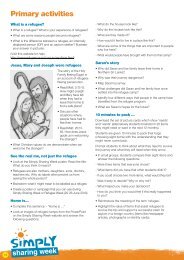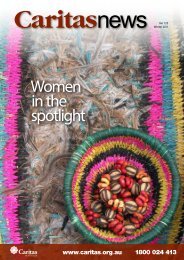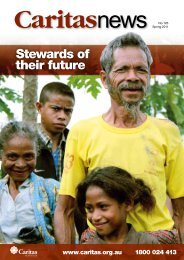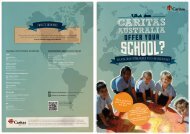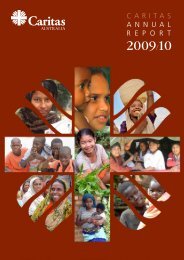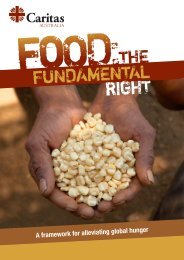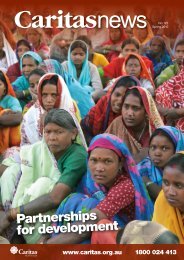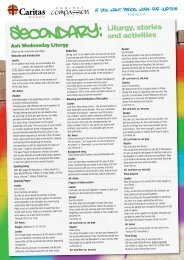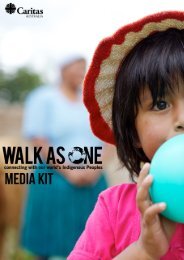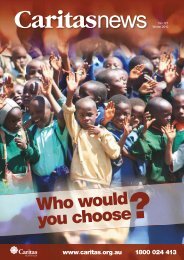Download pdf version - Caritas Australia
Download pdf version - Caritas Australia
Download pdf version - Caritas Australia
You also want an ePaper? Increase the reach of your titles
YUMPU automatically turns print PDFs into web optimized ePapers that Google loves.
THE PACIFIC: FIJIbreadfruitin the Garden IslandA recent visit to <strong>Caritas</strong> <strong>Australia</strong>’s partner the TutuRural Training Centre in Taveuni, Fiji, showcasedhow simple, cost-effective actions can make atangible difference in the lives of rural families.By Stephanie Lalor, Program Coordinator, PACIFIC ISLANDSTaveuni, the third largest islandin Fiji, with its rich vegetation andrural nature is fondly referred to asthe Garden Island. At the Tutu RuralTraining Centre, local farmers are beingtaught how to use traditional andnew methods of planting to ensureaccess to healthy and nutritious food,particularly during and after naturaldisasters.While in Fiji, Stephanie caught upwith Father Petero Matairatu who hasbeen overseeing the implementation ofthe sustainability project since it beganin February 2012.Soil SchoolsIn Taveuni, many families focus ongrowing crops such as yaqona (kava)and dalo for income, planting themin the best soil available. This meansmany local fruits and vegetables are notgrown for food and instead, ‘western’foods such as rice and sugar are beingpurchased from shops with newlyacquired incomes.By integrating simple techniques togrow local foods, Tutu is encouragingyoung farmers to focus on the benefitsof agriculture for healthy living as wellas income generation.Through soil schools, for example,young farmers are learning how totest soil fertility and use strategies toimprove soil quality.“We use biological farmingtechniques, which are a combinationof traditional and contemporaryfarming techniques to improve soilfertility,” said Father Petero.One technique involves using thelocal mukuna bean, which is a smallseed resembling a jelly bean. Plantingthe mukuna bean in less fertile soil andallowing it to grow as foliage across thesoil rehabilitates the ground with thenutrients required for planting fruitsand vegetables.So far, 35 farmers have attended thesoil schools and are seeing an increasein crop yields.“Farmers are benefiting from theseschools, as they are now able to use whatwas once degraded land by re-fertilisingit and being able to plant on it again –4 |
LATIN AMERICA: PERUstrongcommunitiesSince 1980, local partner<strong>Caritas</strong> Huacho has beenworking alongside the Andeanand coastal communitiesof Peru to improve theiragriculture and dairyproduction. The successof the Rural DevelopmentProgram is testament to theirstrong partnerships and thesupport of <strong>Caritas</strong> <strong>Australia</strong>.“The Catholic Church andparticularly the churchin Peru has reinforcedthe Preferential Optionof the Poor as central toour faith and the need toengage with each other.”To strengthen cattlestock across the ruralcommunities, <strong>Caritas</strong>Huacho provideda number of SwissBrown bulls and cows.This program has a number of facets.Not only does it work to improve theproduction of livestock and fruits andvegetables, it encourages communitiesto access their rights as citizens of Peruand facilitate civic participation, withthe desired outcome of strong, wellcoordinatedrural communities withaccess to education and better healthcare.Luis Castillo Polo, Secretary Generalof <strong>Caritas</strong> Huacho recently said, “Overthe years, we have formed friendshipswith the communities and they sharetheir daily concerns with us. In the sameway our staff work with them day by day,we’re partnering with them in their dailylives. Many of them place their trust inus and together we share food, customsand traditions as equals. They haveconfidence in us and our work; they allknow <strong>Caritas</strong>.”Fruits and vegetablesAcross the regions, agricultural andlivestock activities have been passeddown through the generations. Thisprogram works to improve quality oflife by training community membersin sustainable agriculture and organicproduction, thereby increasing theproductivity of crops such as potatoes,broad beans and peas. These activitiesprovide food security and help to generatean income from surplus produce.Communities are also producing fruitsuch as peaches, avocado, apples andcustard apple (cherimoya). For a numberof years, <strong>Caritas</strong> Huacho has beenworking with a small community near theRiver Chico. The provision of tools andspecialised training provided by <strong>Caritas</strong>means this community is now producingaward-winning organic custard applesand generating an income for manyfamilies.Livestock productionTo strengthen cattle stock across thecommunities, <strong>Caritas</strong> Huacho hasprovided a number of Swiss Brown bullsand cows, and many communities alsobreed sheep and alpacas. These animals areused for milk, meat or wool while the drycow pats are used for fuel (for cooking).To ensure the animals’ good health<strong>Caritas</strong> provided alfalfa seeds for pastureto supplement natural grasses; these aregrowing well. Farmers have also learntbasic veterinary training and receivedveterinary kits to care for their animals.With an increase in agriculturalknowledge, an increase in income andthe generous support of <strong>Caritas</strong> <strong>Australia</strong>supporters like you, the farmers are nowable to grow more nutritious food andsend their children to school. They alsohave increased access to better healthcare.“We’re a church organisation andCatholic Social Teaching is a veryimportant component of our work.The Catholic Church and particularlythe church in Peru has reinforced thePreferential Option of the Poor as centralto our faith and the need to engage witheach other,” said Luis.DONATEWhen you donateto <strong>Caritas</strong><strong>Australia</strong>, you arehelping to assistvulnerable peopleand communities.HEAD TOWWW.CARITAS.ORG.AU/DONATE6 |
Africa: KENYAgiving backBernard Wasonga is a Livestock Production Officer with<strong>Caritas</strong> Malindi in Kenya. After crediting his local communityfor his upbringing, he feels that his true path is to give back.Bernard is absolutely committed to assisting local ruralfamilies improve their livelihoods and food security.Bernard Wasonga is proud to work withlocal partner, <strong>Caritas</strong> Malindi, and nowhelps over 600 vulnerable farmers.Bernard and his brother grew upwithout parents, but his local communityand particularly his grandmother ensuredthat all the children in the local area werefed and attended school.He regards his upbringing with fondnessand respect, and says he appreciated theway everyone worked together.At school, Bernard excelled in biologyand chemistry and was awarded agovernment sponsorship to attend theMinistry of Livestock Development DairyTraining Institute in Naivasha where hereceived his Bachelor Degree.After several livestock roles, three anda half years ago Bernard applied for alivestock role with the Catholic Diocese ofMalindi. He recalls the relief and pleasureof receiving the job.“I didn’t mind how much I was paidor where the work was, I just wantedto be involved in promoting a strongcommunity – spiritually, socially andeconomically. I also wanted to teachthem to help each other and build acommunity as good as the one I grew upwith,” he said.Malindi Livelihoods ProjectThe <strong>Caritas</strong> <strong>Australia</strong> funded MalindiLivelihoods Project works in an area ofhigh food insecurity due to droughts,farmer vulnerability and subsequentinadequate resources to mitigate drought.By utilising the church networks tofind the poorest and most vulnerablecommunities, <strong>Caritas</strong> Malindi supportsprojects that address microfinance, foodinsecurity, water, sanitation and hygiene.This is achieved, for example, by givingfarmers agricultural tools and teaching themmodern sustainable farming techniquessuch as growing drought tolerant crops,irrigating vegetable crops and developingtree nurseries for agroforestry.Bernard said heappreciates <strong>Caritas</strong>Malindi’s approach tocommunity developmentas it supports the mostvulnerable. In fact, in thelocal area of Langobayawhere he works, 80percent of the farmers arefemale and many of themare widows.Bernard’s role focuseson caring for livestock. He teachesthe farmers how to build goat housesand the principles of goat health andmanagement. After the training, farmersthen receive improved breed goats toincrease their herd size.However before introducing teachingand training, Bernard said it’s best togo open hearted and at the communitylevel; to listen and learn the culture, andto respect ideas and not to enforce them.He has learned the local language andBernard traininglocal families toconstruct a goathouse. He haslearnt the locallanguage andholds a greatrelationship withthe farmers.Photos: <strong>Caritas</strong>Malindi“I didn’t mind howmuch I was paidor where the workwas, I just wantedto be involved inpromoting a strongcommunity –spiritually, sociallyand economically,”has been a consistentweekly presence at groupmeetings where he jokesand discusses issues freely.He has also become atrusted source of adviceand the farmers happilyshare their successeswith him.Through his extensiveknowledge of livestockmanagement and hiscaring and generous nature, Bernard ishelping to improve the livelihoods of themost vulnerable.Thank you to all <strong>Caritas</strong> <strong>Australia</strong>supporters. Without you we wouldn’tbe able to assist communities likethese. Our aim is for marginalisedcommunities to steer their owndevelopment and become self-sufficient,so they can look forward to the futureknowing that their families andcommunities are happy, safe and well.ACTJoin our <strong>Caritas</strong> online community and bepart of our social justice conversations onFacebook at www.facebook.com/caritasauSPRING 2013 | 7
SOUTH asia: BANGLADESHstrawberry FieldsWhen auto rickshaw driver, Faruqwatched a television program aboutthe cultivation of strawberries, hefelt inspired. Very quickly he sourcedinformation from the local <strong>Caritas</strong>and set to work. His success, in acountry where strawberries arerelatively unknown, is extraordinary.Faruq, 29, is from RanguniaUpazila in Chittagong, southeastBangladesh. He is a great example ofhow the international <strong>Caritas</strong> networkcan assist people from poor andmarginalised areas.In Faruq’s village and surroundingareas, the most regular crop cultivatedis tobacco. So the idea of growingstrawberries was entirely new to the area.Faruq decided his first step was to speakwith <strong>Caritas</strong> Bangladesh who workclosely with the local agricultural office.In 2012, Faruq became a memberof <strong>Caritas</strong> Bangladesh’s livelihoodprogram which trains small farmers andlandholders in sustainable agricultureand organic farming. The NaturalResources Management Project (NRMP),which is funded by <strong>Caritas</strong> <strong>Australia</strong> andAusAID, was exactly what he needed tomove forward on his idea.Very quickly Faruq gathered as muchknowledge as he could on strawberryStrawberries from Faruq’s farm have been very well receivedand there is a high demand for his produce in the marketsof Chittagong city and Rangunia.farming, and with the support of theprogram, set to work.As he didn’t have access to a sufficientamount of land for the commercialproduction of strawberries, Faruqborrowed funds to acquire more landand was also given a small <strong>Caritas</strong> grantto move forward.He told us, “Previously we used tocultivate tobacco on our land. We alwaysused chemical fertiliser and pesticides forcultivation. With the support of <strong>Caritas</strong>, ithas been possible to cultivate strawberriesinstead of tobacco. <strong>Caritas</strong> also assistedin the preparation of organic fertiliserand regularly followed up with me.”Strawberries from Faruq’s farm havebeen very well received and there is ahigh demand for his produce in themarkets of Chittagong city and Rangunia.The income he is earning is helpinghim to pay off the loan for the land; hecan also afford better healthcare andmore nutritious food – for him and hisimmediate family.In July this year, <strong>Caritas</strong> Bangladeshreceived first prize in organic productionat an agricultural fair organised by theAgricultural Department of Rangunia,and Faruq received first prize forstrawberry cultivation.The next step for this strawberry farmeris to cultivate his crop on a large scale inRangunia next season where most of thefarmers grow tobacco. Faruq believes it isa new learning in his life and that manyfarmers have asked him to teach themabout growing strawberries.Faruq is excited about the future andhis new life path.In July thisyear, <strong>Caritas</strong>Bangladeshreceivedfirst prizein organicproductionat anagriculturalfair and Faruq(above, atright) receivedfirst prize forstrawberrycultivation.ACTStay informedabout what’shappening inBangladesh andother countrieswe work in bysubscribing toour e-newsletterat www.caritas.org.au/subscribePhotos: Anurup Kanti Das/<strong>Caritas</strong> BangladeshSPRING 2013 | 9
<strong>Caritas</strong> CommunityRun tobetter daysFor the second year in a row, <strong>Caritas</strong> <strong>Australia</strong>supporter and medical student, Daniel Charles, 21,coordinated Run to Better Days – an epic 15-day,1400km run along the Queensland coast. NicoleClements put on her runners to find out more.From 5 to 19 July, 20 athletespounded the pavements for a goodcause – to raise money for the world’spoor and increase awareness aboutsocial justice and global poverty. Thisyear, as part of the event, the team alsospoke to more than 10,000 QueenslandCatholic primary and secondary schoolstudents along the way.Inspired by the plight of hundredsof millions of people worldwide whostill go hungry, and don’t have access tosafe drinking water or basic healthcare,Daniel spent a year planning lastyear’s event.“I found that <strong>Caritas</strong> <strong>Australia</strong>shared my enthusiasm for educatingthe younger generation about povertyand were willing to assist me in myendeavours to do so. This afforded usa number of opportunities to speakabout our passion to school studentsacross Queensland, empoweringthem to believe that they can make adifference in the lives of the world’spoorest people.”After raising $26,000 in 2012, Danieland his team were inspired to do it allagain, with this year’s event raising over$12,600 so far. It’s an awesome effortby an energetic bunch of people, 11 ofwhom are busy medical students fromJames Cook University.They started their long journeyin Mackay and, running in relayfashion, made it all the way downto Coolangatta. As they crossed thefinish line on the NSW/Queenslandborder, they celebrated with high fives,balloons and a few sighs of relief.“Once again the event has been agreat success and we’re really happy,”said Daniel. “We’re feeling tired, buthave been spurred on by the energyand passion of the people we’vemet along the way. I managed torun 100 kilometres, but others likeGabriella Springall ran an amazing180 kilometres.“It was a courageous effort byeveryone involved and to those whosupported us we say a big thank you.”To donate or find out more aboutRun to Better Days, please go towww.runtobetterdays.comDo you feel inspired to hold yourown event for <strong>Caritas</strong> <strong>Australia</strong>? Headto www.caritas.org.au/fundraisingor contact communityfundraising@caritas.org.auThank you to Daniel and the team,from all at <strong>Caritas</strong> <strong>Australia</strong>!“I cannot express how much organising this event has enrichedmy life over the last three years. The <strong>Caritas</strong> <strong>Australia</strong> teamis an extraordinarily helpful, committed and friendly groupwho make fundraising a genuine pleasure, and given theremarkable work <strong>Caritas</strong> does to improve the lives of thoseliving in poverty across the globe, it goes without saying that<strong>Caritas</strong>’ mission is well and truly one worth supporting.”Daniel Charles (middle row, second from right) and the Run to Better Days team.Photo: Courtesy Run to Better DaysSPRING 2013 | 11
YES, I WANT TO HELP COMMUNITIES BECOMESELF-SUFFICIENT$100 COULD PROVIDE A MICROLOAN TOPURCHASE CHICKENS AND VEGETABLE SEEDS$50 COULD PROVIDE MONEY TOREPAIR A HOME$25 COULD HELP TRAIN ONE PERSON INSUSTAINABLE AGRICULTURAL TECHNIQUES$15 COULD PROVIDE A WATER FILTERI’D LIKE TO GIVE $ TO HELP COMMUNITIES SUFFERING FROM HUNGERHELP PLANT THE SEED FORSELF-SUFFICIENT COMMUNITIES870MIL. PEOPLEIN THE WORLD ARE HUNGRY.Source: The State of Food Insecurity Around the World, UN 2012POVERTYIS THE MAIN SOURCE OF HUNGER.Donor Number (if known)Name Ms Miss Mrs Mr or otherAddress:Postcode:Phone:Parish:Signature:PLEASE DEBIT MY CREDIT CARD:Visa MasterCard Amex DinersCard Number:/ / /Expiry Date: /Name on card:Signature: Date: / /You can help communities like Nhoy Len’s overcome poverty and hunger.FROM NOW ON I WANT TO GIVE MONTHLY.Please charge my credit card or direct debit account with this amounton the 27th of each month.Complete the form to the right and return it in the envelope providedor fax it to 1800 887 895or call us on 1800 024 413 with your credit card detailsvisit us online at www.caritas.org.au/donateor drop in to see us at 24-32 O’Riordan St, Alexandria NSW 2015PLEASE DIRECT DEBIT MY ACCOUNT:Financial institution name and branch:BSB: /Before payments commence, <strong>Caritas</strong> <strong>Australia</strong> will provide you with a full Service Agreement andconfirmation of your details regarding this arrangement. Payments will be deducted on 27th of themonth. If this is not a normal business day, payment will be deducted on the next normal business day.I would not like to receive information about the work of <strong>Caritas</strong> <strong>Australia</strong>Privacy Statement: The information provided by you will only be used for the purpose of giving youinformation and the activities of <strong>Caritas</strong> <strong>Australia</strong>.The Catholic Agency for International Aid and DevelopmentAccount No:Account name:Signature: Date: / /Please send me information about including <strong>Caritas</strong> <strong>Australia</strong> in my will.N3TD 3.13NL




